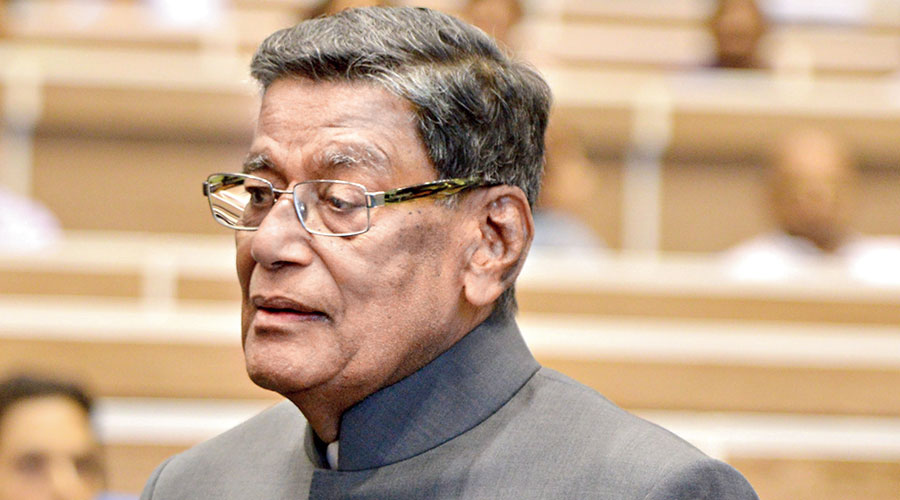Attorney-general K.K. Venugopal has declined permission for the initiation of contempt proceedings against Bollywood actress Swara Bhasker over her purported remarks relating to the Supreme Court’s November 2019 Ayodhya verdict.
One of the statements the petition attributed to Bhasker was: “It seems we are now in a situation where our courts are not sure whether they believe in the Constitution.”
Venugopal felt this was a vague statement not related to any particular court. About another remark cited by the petitioner, the attorney-general said it “appears to a factual one and is a perception of the speaker”.
The petitioner, Usha Shetty, had on August 18 sought Venugopal’s permission for Bhasker’s prosecution on contempt charges.
On August 21, the attorney-general, the highest law officer in the country, declined, saying Bhasker’s statement had not in any manner scandalised the Supreme Court or lowered its image.
Shetty was represented by three advocates — Anuj Saxena, Prakash Sharma and Mahek Maheshwari. It was Maheshwari who had moved the contempt petition against lawyer Prashant Bhushan for his tweets on Chief Justices of India, past and present, but the apex court had converted the matter into a suo motu case.
On Sunday night, Bhushan tweeted: “Kudos to the AG Mr Venugopal for boldly asserting his independent position as a Constitutional authority & refusing permission to the malafide attempt to charge @ReallySwara for Contempt of Court.”
Once the Supreme Court takes suo motu cognisance, no permission is needed from the attorney-general or the solicitor-general. In the Bhushan case, the top court had sought the assistance of the attorney-general, who enjoys a constitutional status on a par with Supreme Court judges.
On Thursday, Venugopal had requested the apex court “not to punish” Bhushan, while clarifying he was appearing as attorney-general and not as the representative of the Union government.
Under Section 15 the Contempt of Courts Act and the Supreme Court rules, contempt can be initiated in the top court under three circumstances:
#The Supreme Court can on its own initiate contempt proceedings, as it did against Bhushan.
# The attorney-general or the solicitor-general can file an application seeking contempt proceedings against a person.
# A citizen can seek criminal contempt proceedings against another person with the consent of the attorney-general or the solicitor-general.
Shetty had cited a statement Bhasker had made at a February 1 event hosted by Mumbai Collective, a citizens’ group, and flagged two comments from it.

KK Venugopal
The petitioner quoted Bhasker as saying: “We are living in a country where the Supreme Court of our country states that the demolition of the Babri Masjid was unlawful and in the same judgment rewards the same people who brought down the mosque.”
She was also quoted as saying: “We are ruled by a government that doesn't believe in our Constitution; we are ruled by police forces that do not believe in the Constitution; it seems we are now in a situation where our courts are not sure whether they believe in the Constitution or not....”
Venugopal’s response to Shetty’s petition said: “The statement in the first part appears to be a factual one and is a perception of the speaker. The comment refers to the judgment of the Supreme Court, and is not an attack on the institution.
“This does not offer any comment on the Supreme Court itself or say anything that would scandalise or tend to scandalise, or lower or tend to lower the authority of the Supreme Court. In my opinion, the statement does not constitute criminal contempt.
“The second statement that ‘we are now in a situation where our courts are not sure whether they believe in the Constitution or not…’ is a vague statement not related to any particular court, and something which is so general that no one would take any serious note of this statement.
“I do not think that is a case where the offence of scandalising the court or lowering the authority of the court would arise. I therefore decline consent to initiate contempt proceedings against Ms Swara Bhasker.”
Shetty’s lawyers later wrote to solicitor-general Tushar Mehta seeking his consent for contempt proceedings against Bhasker. However, once the attorney-general had given his opinion, the solicitor-general, who is second in command, cannot overrule him.
Bhasker has acted in several popular Hindi films, including Raanjhanaa, Nil Battey Sannata and Veere Di Wedding.










